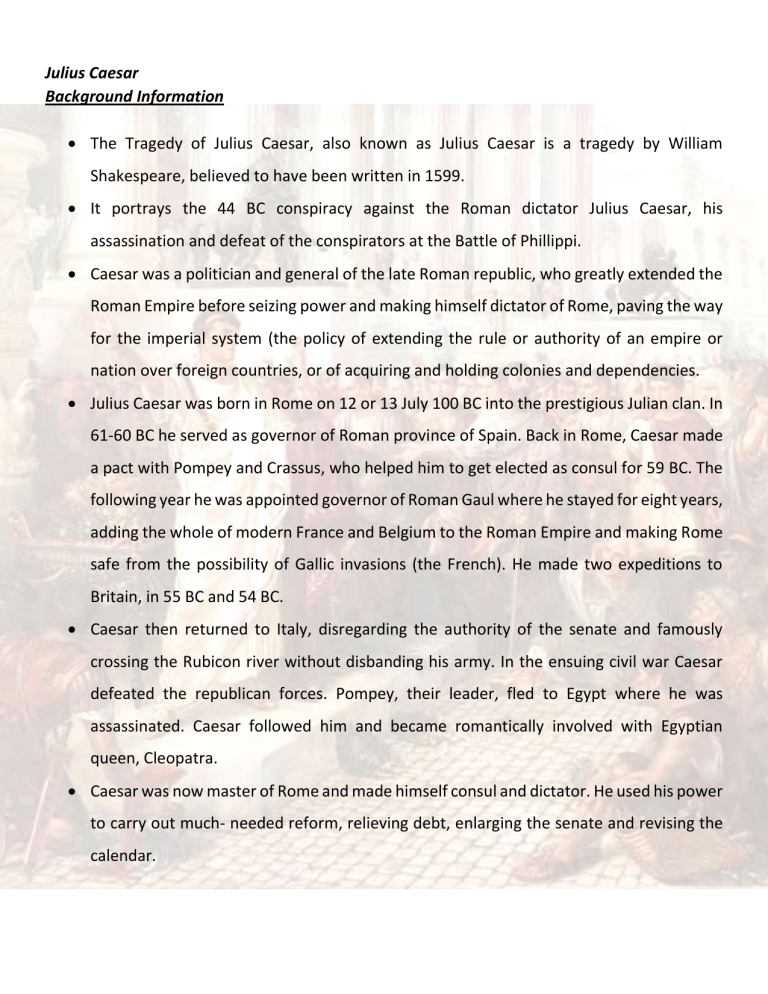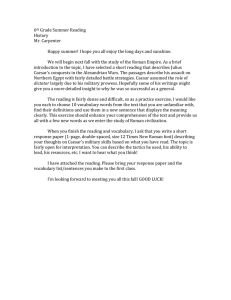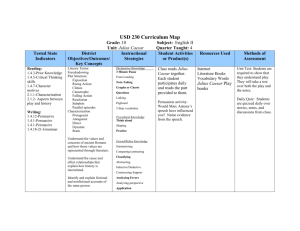
Julius Caesar Background Information The Tragedy of Julius Caesar, also known as Julius Caesar is a tragedy by William Shakespeare, believed to have been written in 1599. It portrays the 44 BC conspiracy against the Roman dictator Julius Caesar, his assassination and defeat of the conspirators at the Battle of Phillippi. Caesar was a politician and general of the late Roman republic, who greatly extended the Roman Empire before seizing power and making himself dictator of Rome, paving the way for the imperial system (the policy of extending the rule or authority of an empire or nation over foreign countries, or of acquiring and holding colonies and dependencies. Julius Caesar was born in Rome on 12 or 13 July 100 BC into the prestigious Julian clan. In 61-60 BC he served as governor of Roman province of Spain. Back in Rome, Caesar made a pact with Pompey and Crassus, who helped him to get elected as consul for 59 BC. The following year he was appointed governor of Roman Gaul where he stayed for eight years, adding the whole of modern France and Belgium to the Roman Empire and making Rome safe from the possibility of Gallic invasions (the French). He made two expeditions to Britain, in 55 BC and 54 BC. Caesar then returned to Italy, disregarding the authority of the senate and famously crossing the Rubicon river without disbanding his army. In the ensuing civil war Caesar defeated the republican forces. Pompey, their leader, fled to Egypt where he was assassinated. Caesar followed him and became romantically involved with Egyptian queen, Cleopatra. Caesar was now master of Rome and made himself consul and dictator. He used his power to carry out much- needed reform, relieving debt, enlarging the senate and revising the calendar. Dictatorship was always regarded a temporary position but in 44 BC, Caesar took it for life. His success and ambition alienated strongly republican senators. A group of these, led by Cassius and Brutus assassinated Caesar on Ides (15) March 44 BC. This sparked the final round of civil wars ended the Republic and brought about the elevation of Caesar’s great nephew and designated heir, Octavian as Augustus, the first emperor. On March 15, 44 BC, the conspirators attacked Caesar in the Senate hall, stabbing him a total of 23 times. Not everyone in Rome wanted Caesar dead. Plebeians (regular citizens) loved Caesar and rioted after his murder. It is one of several Roman plays that Shakespeare wrote, based on true events from Roman history, also include Coriolanus and Antony and Cleopatra. Although the title of the play is Julius Caesar, Caesar is not the central character in its action. He appears in only three scenes and is killed at the beginning of the third act. The protagonist of the play is Marcus Brutus and the central psychological drama is his struggle between the conflicting demands of honour, patriotism and friendship. The play reflected the general anxiety of England over succession of leadership. At the time of its creation and first performance, Queen Elizabeth, a strong ruler, was elderly and had refused to name a successor, leading to worries that a civil war similar to that of Rome might break out after her death. Julius Caesar (BBC/Time-Life TV, 1978), a television adaptation in the BBC Television Shakespeare series, directed by Herbert Wise and produced by Cedric Messina, starring Richard Pasco as Brutus, Keith Michell as Antony and Charles Gray as Caesar. Julius Caesar (2010), is a short film starring Randy Harrison as Brutus and John Shea as Julius Caesar. Directed by Patrick J Donnelly and produced by Dan O'Hare.



